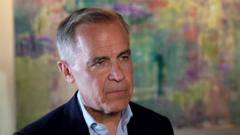The independence sentiment in Alberta is gaining momentum as residents express frustration with longstanding Liberal governance and call for a greater say in their future, including the potential for independence or union with the US.
Alberta's Independence Movement Gains Traction Amid Political Frustration

Alberta's Independence Movement Gains Traction Amid Political Frustration
Calls for Alberta to consider independence or alignment with the US intensify as residents voice dissatisfaction with federal governance.
In the heart of Lethbridge, Alberta, a growing sense of discontent is prompting discussions about the province's future. During a recent event led by Dennis Modry, co-leader of the Alberta Prosperity Project, attendees debated whether Alberta should seek greater autonomy, with many raising hands in favor of secession or even joining the United States.
The atmosphere has shifted significantly over the past decade, particularly with President Donald Trump's comments insinuating Canada could become the 51st state. This rhetoric has emboldened the separatist movement, gaining traction among those frustrated with what they perceive as neglect from the federal government, particularly under the Liberal Party.
Johnson, a retired heart surgeon, has seen attendance at their meetings grow as residents voice dissatisfaction over federal policies, especially those viewed as detrimental to Alberta’s oil and gas industry. Support for independence now presents a tangible challenge for political leaders, as a recent poll indicated that nearly half the attendees would favor a split.
The stature of Mark Carney at the federal level has sparked mixed reactions. His leadership has been viewed by some as a potential remedy for Alberta's concerns; however, others, like Judy Schneider, feel disconnected from him despite his Alberta roots.
Opinion pieces are echoing the calls for change, with Preston Manning, a prominent figure in Canadian conservativism, stating that another four years of Liberal governance may push many Albertans to support secession.
Underlying this desire for independence are decades of perceived "western alienation," a sentiment that suggests the central government has failed to heed Western provinces' needs. Alberta's economic clout due to its resource wealth has led to deeper frustrations, particularly when policies under Liberal leadership are seen as punitive toward the oil and gas sectors.
Political analysts caution that this divide poses significant risks to national unity, no matter which party emerges victorious in the upcoming elections. Alberta's Premier, Danielle Smith, has even raised alarms about potential unrest if demands from her province are unmet.
While separations discussions are at the forefront, opinions remain varied within the movement. Some participants, like Lorna Guitton, advocate for a better relationship with the rest of Canada rather than full independence. Conversely, others such as lawyer and rancher Jeffrey Rath envision a closer alignment with the US.
As Alberta grapples with its identity and future, the independence movement’s viability remains a focal point of political discourse, reflecting a desire for representation and a response to longstanding grievances in the region.





















